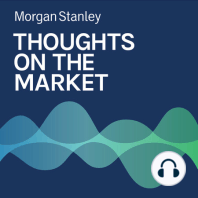3 min listen

Mid-Year Economic Outlook: A Dichotomy Worth Watching
Mid-Year Economic Outlook: A Dichotomy Worth Watching
ratings:
Length:
11 minutes
Released:
Jun 8, 2023
Format:
Podcast episode
Description
As we look toward the second half of 2023, the U.S. and Europe are likely to see very slow growth but avoid a recession, while Asia may be poised to become an engine of economic growth.----- Transcript -----Andrew Sheets: Welcome to Thoughts in the Market. I'm Andrew Sheets, Morgan Stanley's Chief Global Cross-Asset Strategist. Seth Carpenter: And I'm Seth Carpenter, Morgan Stanley's Global Chief Economist. Andrew Sheets: And on this special two part episode of the podcast, we'll be discussing Morgan Stanley's global mid-year outlook. Today we'll focus on economics, and tomorrow we'll turn our attention to strategy. It's Thursday, June 8th at 3 p.m. in London. Seth Carpenter: And it's 10 a.m. in New York. Andrew Sheets: Seth, it's great to sit down with you. We've been talking over the last several weeks as Morgan Stanley's gone through this outlook process. And this is a big joint collaborative forecasting process across Morgan Stanley research, where the economists and the strategists get together and think about what the next 12 to 18 months might look like. And, you know, we're sitting down at this really fascinating time for markets. The U.S. labor market is at some of its strongest levels since the late 1960s. Core inflation is at levels that we really haven't seen since the 1980s. The Federal Reserve and the European Central Bank have been raising rates at a pace that hasn't really been seen in 30 or 40 years. So, as you step back from all of these quite unusual occurrences, Seth, how do you frame where the global economy is at the moment and where is it headed? Seth Carpenter: I'd say there's one major dichotomy that I'll first start with in the global economy. On the one hand, Asia as a region really poised to have the strongest economic growth. And in very sharp contrast, when I think about the rest of the world, the United States and the Euro area, we see those as being actually quite weak. Second, China, you can't get out of a discussion of the global economy without talking about China. And there, the first quarter saw massive growth in China as all of the restrictions from COVID were removed, and as the government shifted the rest of its policies towards being supportive of growth. Now, there's been a little bit of a stumble in the second quarter, but we think that's temporary. And so you'll see a cyclical boost to Asia, coming out of China. Layer on top of this our structurally bullish views on economies like India and Indonesia, where there's a medium term, really positive note, you have all of these coming together, and it sets the stage for Asia really to be an engine of economic growth. The sharp contrast, the United States, the euro area. The inflation that you referenced has led central banks to raise interest rates for one reason and one reason alone. They want to slow those economies down, so the inflationary impulses start to fade away. Andrew Sheets: So Seth that's great context, and I'd like to drill down a little bit more detail on two economies in particular, the United States and China. For the United States, this idea of a soft landing, I think investors will point to the fact that given how strong the labor market is, given how high inflation is, given how inverted the yield curve is, given how much banks are tightening lending conditions, all those factors make it less likely historically that a recession is avoided. So, why do you think a soft landing is the most likely option here? Why do you think that that's our central scenario? Seth Carpenter: Yeah, I completely agree with you, Andrew. The discussion, the debate, the push back, the soft landing part of our thesis is definitely central to all of that discussion. Maybe I'll just start a little bit with the definition because I think the phrase soft landing can mean different things to different people. What I don't mean is that we just have great economic growth and inflation comes down on its own. Quite to the contrary, we are looking for e
Released:
Jun 8, 2023
Format:
Podcast episode
Titles in the series (100)
Andrew Sheets: For Markets, Signs, Signs, Everywhere Signs by Thoughts on the Market